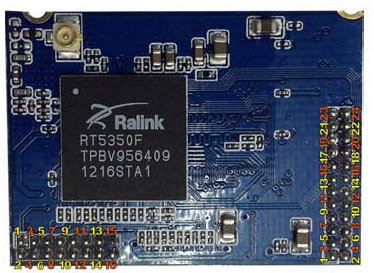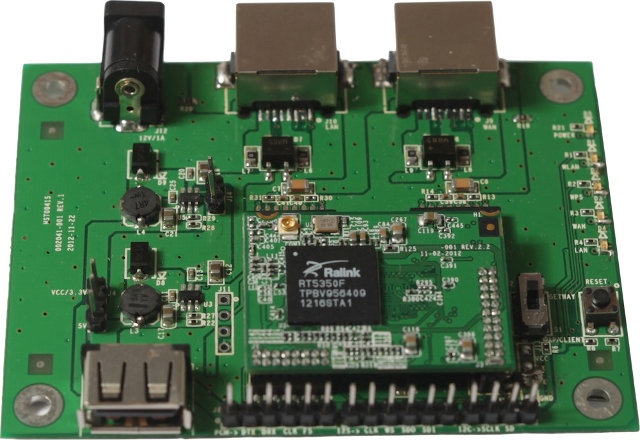This week-end I explained how to build a web server that could be used for automation and other Internet of things applications for less than $15 by combining an Arduino Leonardo with ECN18J60 Ethernet module. The hardware itself is cheap, but it may not always be convenient, or cost effective, to wire your house or office with Ethernet cables. One solution is to use Wi-Fi modules such as TI CC3000 evaluation module, an Electric Imp module, or Ariettea G25 + Wi-Fi board, but these usually cost between $30 to $50 in single quantity. AsiaRF AWM002 and AWM003 are low cost 802.11n Wi-Fi modules with access to GPIOs that could be an interesting alternative as they cost $15 + shipping, and even below $10 in quantities. The only difference between the two is that AWM003 supports more RAM (64MB vs 32MB).
 Here are the specifications for these modules:
Here are the specifications for these modules:
- SoC – Mediatek/Ralink RT5350 MIPS 74KEc core @ 360 MHz dual band 802.11n Wi-Fi with data Rate up to 150Mbps, hardware NAT, QoS, TCP/UDP/IP checksum offloading.
- System Memory
- AWM002 – 32 MB (default), 16MB optional
- AWM003 – 64MB
- Storage – 8MB NAND flash (default), options: 16MB, 8MB, and 2MB
- Security – 64/128-bits WEP, TKIP,WPA, WPA2,AES,WPS
- Multi-modes – AP/Client
- Antenna – 1x iPex connector (PIFA optional)
- Transmit Power (EIRP)
- 11n HT40 MCS7 : +14 dBm
- 11b CCK: +20 dBm
- 11g OFDM: +16 dBm
- Receiver Sensitivity
- -70dBm at HT40 MCS7
- -78dBm at 54Mpbs
- -90dBm at 11Mpbs
- Headers
- PIN I – 24-pin with access to GPIOS, 3.3V, 1.2V, GND, UART, USB, Ethernet..
- PIN II – 16-pin with access to I2C, I2S, PCM, Ethernet…
- Power – +3.3V
- Dimensions – 25x35mm
- Certifications – FCC/CE (by request)

Apart from more details specs for AWM002 and AWM003 modules, there’s very little information on the manufacturer website with regards to software support and development. The good thing however is that it’s supported by OpenWRT, so you can run a known Linux distributions found in many low cost routers with the added bonus to have access to GPIOs. Instructions to load and configure the module can be found in the OpenWRT page.
I’ve been informed about these modules thanks to Jon, who happens to have contributed to OpenWRT support for the modules. He also mentioned that the board themselves comply with FCC, but you’d either need to include an FCC compliant antenna made by the company, or have your own certified again by the FCC. He also let us know that a $45 evaluation kit is available (shown above). Alternatively, a board (AP2620-P) powered by Mediatek MT7620 with Wi-Fi, two Ethernet ports, and easy access to GPIOs, I2C, SPI and more… can be purchased for $20 (sample price). The company claims it supports OpenWRT, and although I failed to find an OpenWRT Wiki page for this board, MT7620 is definitely supported by OpenWRT.
The only downside is that AsiaRF does not really cater to individuals. You may be able to get a few samples however. You need to fill a form to order, and shipping costs are not mentioned. Those two RT5350 modules could however be a good base to make low cost hobbyist boards with Wi-Fi and/or Ethernet for the Internet of things.

Jean-Luc started CNX Software in 2010 as a part-time endeavor, before quitting his job as a software engineering manager, and starting to write daily news, and reviews full time later in 2011.
Support CNX Software! Donate via cryptocurrencies, become a Patron on Patreon, or purchase goods on Amazon or Aliexpress





This sounds like competition for 8 devices carambola and carambola 2 devices. See http://shop.8devices.com/wifi4things for comparable devices based on either the RaLink RT3050 or Atheros AR9331.
Openwrt page is here:
http://wiki.openwrt.org/toh/asiarf/awm-evb
@Jon Smirl
Thanks. I found that one.
I was referring to AP2620-P board (Mediatek MT7620).
I have this module:
http://www.aliexpress.com/item/Free-Shipping-HLK-RM04-aerial-serial-wifi-dual-ethernet-port-serial-port-UART-to-WIFI-module/1779330533.html
http://www.aliexpress.com/item/wifi-module-RS232-serial-to-Ehernet-HLK-RMO4-startkit-free-shipping/1444943150.html
Which runs openwrt:
http://wiki.openwrt.org/toh/hilink/hlk-rm04
It has GPIO pins exposed as well.
13USD here for the board:
http://www.aliexpress.com/item/Free-Shipping-HLK-RM04-aerial-serial-wifi-dual-ethernet-port-serial-port-UART-to-WIFI-module/1779330533.html
You could make your own PSU and ethernet adaptor, it is just a matter of connecting few pins and adding a chip for the 12V ethernet voltage level.
We evaluated both the Carambola and HLK. There is nothing wrong with Carambola it is a fine device. It was just too expensive for our application.
HLK is fine as a UART to wifi device. It isn’t useful for much else since it doesn’t expose most of the peripherals. We needed to add external chips and the pins we needed were not exposed.
All three of these need to redo FCC when you add the antenna. FCC approval is only good if you use exactly the same antenna that was used during the original testing. So modules with chip/PCB antennas can get FCC modular approval. But redoing FCC part B in China is not that big of deal since it can be done for under $1000 (more like $10,000 in US) and maybe as low as $600.
If you are only building ten of something find a wifi unit that includes the antenna and has FCC modular approval. That type of module runs about $35.
@zoobab,
That model has only 16MB RAM. To run the Openwrt projects smoothly, you need 32MB of RAM for many applications.
AWM002 is 32MB, AWM003 is 64MB. I have not run into issues with RAM capacity. You can get AWM002 with 16MB but I am not sure anyone has ever ordered one with 16MB.
@zoobab
Hilink $13 Wi-Fi module and $20 kit both look interesting.
But I can see only one or two GPIOs (depending where I read), and 16MB RAM may be a limitation for OpenWRT as pointed our by @armer . It depends on your application(s) I suppose.
There is a SD card slot and it seems to be connected to the SPI signals of RT5350.
Can we access the SD file system with the OpenWrt?
CNX – can you email paul@asiarf.com and exchange phone numbers? He is trying to contact you with corrections for the story. Paul is based in Taiwan.
@armer
OpenWRT has introduced lua web interface, which makes my old WRT54G with 16MB going bonkers and 100PC CPU, if you disable it and run only the command line config, it works fine again. Depends on your app.
@Jon Smirl: Can you please confirm if AsiaRF stuff has JTAG pins? That’s problem with HLK modules for example.
FCC ID for the module is: TKZAWM002
So goto http://transition.fcc.gov/oet/ea/fccid/
Enter TKZ for grantee, AWM002 for product
Now click on Detail, then User’s Manual.
How to access JTAG is in the manual.
@Paul Any cheap ARM JTAG unit will work. I was able to get OpenOCD working but I have to some changes to the source of OpenOCD. I posted the changes to the OpenOCD list, it is problems with OpenOCD and Ralink version of MIPS CPU, nothing specific to AWM002 module.
@zoobab
I’ve had no problem with the Lua web interface on my WRT54GL.
OpenWrt Backfire 10.03.1-RC6 | Load: 0.08 0.06 0.01
(I don’t know why it says -rc6, maybe someone forgot to remove that before releasing the final 10.03.1)
@Jon Smirl
http://FCC.io/TKZ/AWM002
Ordered strait from Asiarf…
AWM002 (8MB Flash /32MB SDRAM)–USD15
Baseboard for AWM002—USD40/pcs